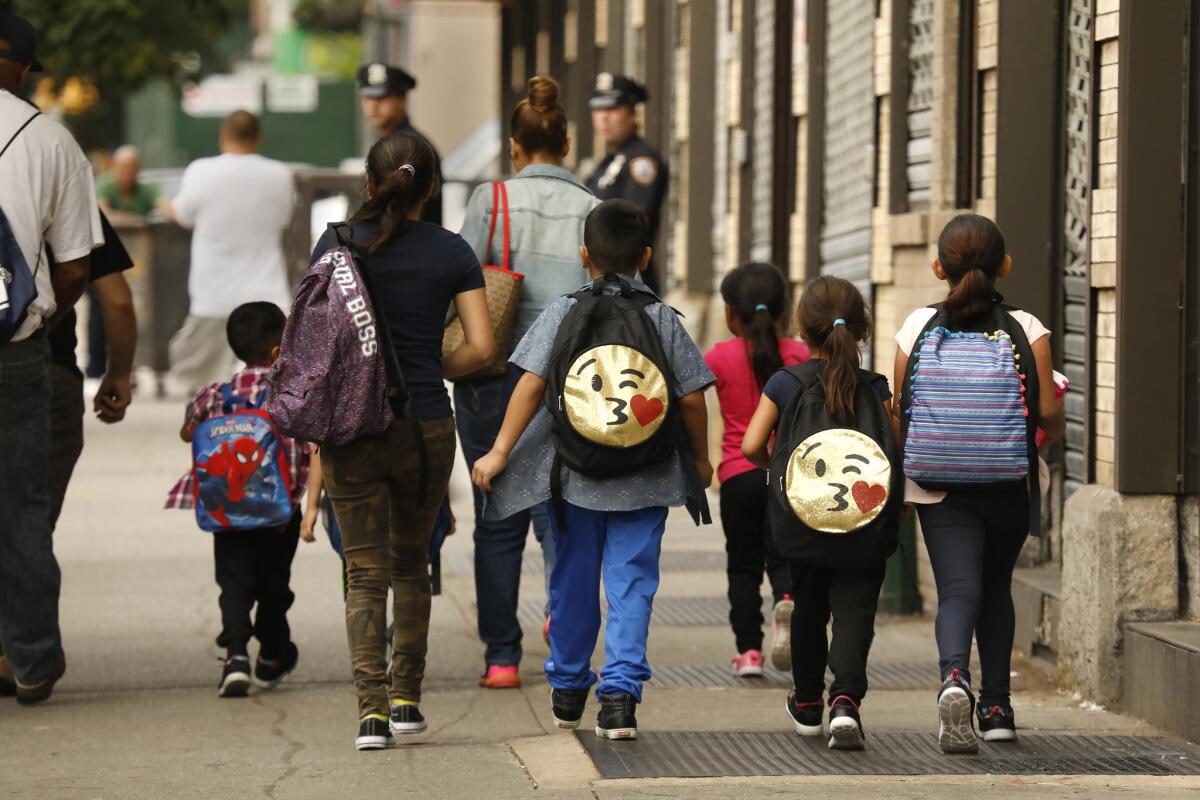Op-Ed: The crime against migrant children that Biden needs to repair

More than 5,400 children have been detained and separated from their parents at the U.S.-Mexico border by the Trump administration since 2017. Many families remain separated, and the violence of this policy has been compounded by the government’s failure to keep track of the families it tore apart as it sent children to shelters all over the country and then deported their parents.
The parents of 628 children still have not been found. Just recently, it was revealed that the Trump administration withheld critical contact information for the parents, which could have been used to help locate them.
Even as the country prepares to transition to a new administration that has promised to end family separation practices and to reunify children with their parents, the details remain uncertain at best. President-elect Joe Biden has not yet committed to allowing the reunions — once the parents are found — to occur within the U.S. or, critically, to grant the reunited families asylum here.
It does not take an expert to recognize that forcible separation of families at the border is a severe human rights violation. Images of children screaming as they are pulled from their parents by border patrol officers, as well as the narratives of their experiences, have haunted people across the world since news of this unspeakably inhumane practice broke in 2018. Even more horrific, nearly 20% of the children whose families cannot be located were under the age of 5 at the time of the separation.
As clinical developmental neuroscientists, we know that traumas like these, no matter when they occur in life, drastically increase both short- and long-term risks of mental and physical health problems. But severe trauma has especially harmful effects in early childhood. This is because early childhood is a time of rapid brain development, and the experiences of young children set the stage for what the body’s stress response system expects to encounter in the future.
When the body enters fight or flight mode in response to toxic stress during childhood, it is preparing for a lifetime of more stress. Compounding this effect, separation from caregivers is especially deleterious in early childhood, as children rely solely on their caregivers to cope with stress. At the neurobiological level, the mere presence of a caregiver can regulate children’s stress systems by damping reactivity in the amygdala, a region of the brain that responds to stress.
Years after suffering childhood trauma, adults still show lasting alterations in the brain’s networks that govern fear and emotion regulation. Such biological changes can result in debilitating symptoms of post-traumatic stress disorder and anxiety. There is also compelling evidence for a dose-response effect: The detrimental effects of exposure to trauma are worse for children who experience longer durations of trauma. Psychological treatment can sometimes lessen the impacts of these events, but time is of the essence.
The new administration must immediately reunify and provide mental health care services to affected families. Clinical intervention for young children exposed to trauma can help them reestablish a sense of safety in primary attachment relationships with caregivers, learn about their bodies’ response to trauma, and create narratives about their experiences through talking and playing.
Every day of separation from caregivers matters in the life of a young child, and even a few months’ delay while the Biden administration decides how to proceed is enough to intensify the adverse effects of trauma on emotional and neurobiological development.
Much of the notoriously difficult work of finding parents and reunifying families has fallen to nonprofit immigrant rights groups. Full reunification for all families will be an enormous and time-consuming challenge for the incoming administration. This work needs to begin immediately.
The new administration must also grant the parents and caregivers of separated children asylum in this country so that families can be reunited as expeditiously as possible. Deporting children to countries from which their families fled — and where they are likely to experience additional trauma — places them at an even higher risk, because past exposure to trauma heightens the likelihood of developing post-traumatic stress disorder. The symptoms of post-traumatic stress disorder — such as flashbacks and hypervigilance for signs of danger in the environment — can severely undermine a child’s ability to grow, learn and thrive in all domains of life.
The Trump administration’s immigration policies were designed to inflict the greatest possible suffering on migrant families. In Biden’s first speech as president-elect, he vowed to “marshal the forces of decency, the forces of fairness … the forces of science and the forces of hope in the great battles of our time.”
Thousands of children are waiting for the Biden-Harris administration to make good on its promise, and every day matters.
Emily Cohodes, Sahana Kribakaran and Dylan Gee are clinical developmental neuroscientists at Yale University. They study the effects of early-life trauma on brain development and mental health.
More to Read
A cure for the common opinion
Get thought-provoking perspectives with our weekly newsletter.
You may occasionally receive promotional content from the Los Angeles Times.










